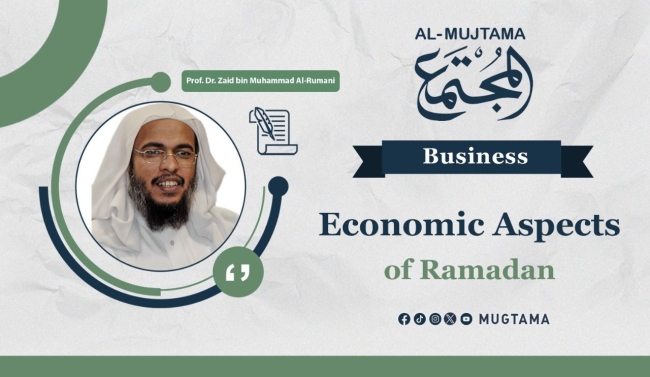Economic Aspects of Ramadan
David Stray believes that fasting is economical, serves as a substitute for cosmetic products, provides complete rest for the digestive system, allows the body the opportunity to rid itself of accumulated toxins and waste, and enables it to repair itself.
Below, we explore the key economic aspects of the obligation of fasting:
First: Fasting and Consumption
It is evident that there is a direct correlation between fasting and excessive consumption. One is astonished by the rampant consumerist appetite that spreads among people during this month. Everyone rushes into a cycle of consumption, with preparations for it starting early, accompanied by an overwhelming wave of advertisements that besiege families through various means. As a result, people are primed to fall into the trap of extreme consumption—wives push for more purchases, children insist on their consumer demands, and individuals themselves feel an insatiable urge to buy anything consumable.
There is wastefulness and extravagance to an absurd degree. The quantities purchased during regular days multiply many times over in Ramadan, despite the fact that it includes only two meals.
Second: Fasting and Spending
Spending in Ramadan includes obligatory expenses, such as the expiation (kaffarah) for those unable to fast, as well as Zakat al-Fitr.
One of the meanings of fasting is abstaining from the desire for food, which, in economic terms, translates into a reduction or rationalization of expenditure. Extravagant spending in Ramadan is inconsistent with the conditions of most Muslim societies, which are developing nations that need to preserve every resource and prevent waste. What happens in Ramadan is a squandering of financial resources inappropriately, a neglect of noble values that Islam urges us to uphold, and a disregard for the virtue of contentment.
The month of fasting is undoubtedly an opportunity for the Muslim nation to learn a valuable economic habit—spending rationalization. It presents a periodic chance to reassess essential expenditures, set priorities, and determine the possible surplus that should be directed toward investments.
Moreover, Ramadan offers a chance to implement this rationalization and expand the available financial surplus, provided it is tied to the principle of avoiding wastefulness and extravagance. This aligns with the divine guidance: "And eat and drink, but be not excessive." (Al-A'raf: 31)
And the saying of the Prophet (peace be upon him): "Eat what you like and wear what you like as long as two things miss you: prodigality and pride."
Third: Findings and Recommendations
These economic attributes are inherent in the essence of fasting, as it is linked to economic factors such as consumption, expenditure, wealth, levels of need, and degrees of satisfaction. Activating these attributes and enhancing their effectiveness is the responsibility of the fasting community—at the individual level by controlling consumption and improving economic behavior, and at the institutional level by developing systems to efficiently collect and allocate expiation funds, zakat, and charity, and optimizing their economic impact.
The month of fasting provides an opportunity for the affluent to experience the emotions of those in need. However, this depends on several factors, including fasting's effect on the wealthy in relation to the needy, the presence of religious consciousness that ensures the proper appreciation of the necessity of paying expiation and Zakat al-Fitr, and the efficient allocation of these funds.
A plan to combat consumerist greed has become essential, both in Ramadan and beyond. This escalating consumption frenzy in our societies signifies a severe behavioral backwardness. A simple look at the overflowing garbage bins reveals our urgent need to reassess our consumer values and shift them toward productivity or at least toward rational consumption.
Thus, consumption and spending have serious implications that threaten our economic well-being and national security. Will Ramadan serve as an opportunity to cultivate the willpower needed to counter excessive consumption and extravagant spending habits?
-------------------------------------------------------------
- For contact: This email address is being protected from spambots. You need JavaScript enabled to view it.


